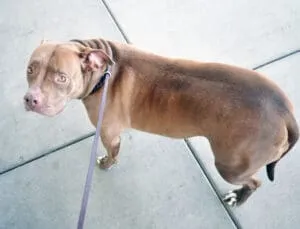Has your vet ever said anything about your dog’s weight?
Published:
A professional organization called the Association for Pet Obesity’s Prevention (APOP) recently released a report stating that most of the dogs in the U.S. are overweight, their owners don’t know it, and their veterinarians don’t feel comfortable talking to their clients about it. This feels like crazyland to me!
I think I have to agree with the premise that most people really don’t recognize their dogs’ weight problem. When I attempt to have conversations with the owners of fat larger breed dogs, nine times out of 10, the owner will say, “Well, his mother and father both weighed over 100 pounds, these are just a large breed!” Or, “He’s in the weight range for the breed standard!” Ignoring the fact that the dog has no waist whatsoever and is literally covered with fat rolls.
Small dog owners often just think their dogs are cute. And as long as they can pick them up, they don’t think the weight is a problem.
When lick their own butts, it helps keep the anal glands in working order. Big dogs have fewer problems with their glands than small dogs partly because they have bigger, stronger tongues, which help massage and empty the glands when they lick their butts. When dogs like Dinah get too fat to reach their bottoms with their tongues, the glands can become impacted and infected unless the owner is aware of this and makes sure to either empty the glands or take the dog to a groomer or vet occasional to have the glands checked and emptied.
Anyway, to me, the most shocking part of the report is the allegation that 84% of the veterinarians who responded to the survey said they don’t want to upset their clients by talking about their dogs’ weight. But health and weight are so linked in dogs! I think that if a vet fails to discuss a dog’s overweight it’s a total dereliction of their veterinary duty! The problems associated with or directly caused by obesity in dogs are legion!
And yet, I get it. A vet only gets so much time with a client, and it probably often feels like there isn’t enough time to talk about the dog’s more pressing health issues and the overweight condition—even if the obesity may have contributed to the problem. Even at well-pet visits, people often spend more time discussing flea and heartworm preventives, vaccines, and the like.
My friend Tim Steele, a gifted dog trainer (who broke my heart by moving from my area to Florida a couple years ago), once told me that he never talks directly to dog owners about their dogs’ weight problems; he addresses his concerns to the dog—in front of the owner, obviously! He’ll say, “Oh my goodness, who is measuring your food? Or are you sneaking into the refrigerator at night?! I think you need to get on a little diet!” Often, he reports, the owner will join the “conversation” at that point, saying something like, “Do you really think he needs to be on a diet?” instead of feeling directly confronted. I think that’s a genius approach—and perhaps one I can recommend to veterinarians!
My appreciation to reporter Tim Wall of Petfood Industry for being the first to cover the APOP’s 2023 survey.



Leave a Reply